Cross-Cultural Learning Report: Exploring Chinese Culture
VerifiedAdded on 2023/05/29
|5
|1243
|55
Report
AI Summary
This report details a student's cross-cultural learning experience, specifically focusing on an event celebrating the Chinese New Year. The student aimed to gain insights into Chinese culture, address cultural curiosity, and potentially apply this knowledge in a human services career. The report describes the event attended in Canada, interactions with Chinese people, and the student's expectations versus the actual experience. While the event did not fully meet the initial expectations in terms of in-depth cultural education, it provided opportunities for interaction, learning about personal stories, and observing cultural expressions like dance and traditional songs. The report reflects on the challenges of stereotype elimination and the importance of understanding diverse cultural values. The student concludes that the experience, though incomplete in some aspects, provided a foundation for future learning and career development in a cross-cultural environment, emphasizing the value of understanding different family traditions and their unique approaches to traditions and beliefs.
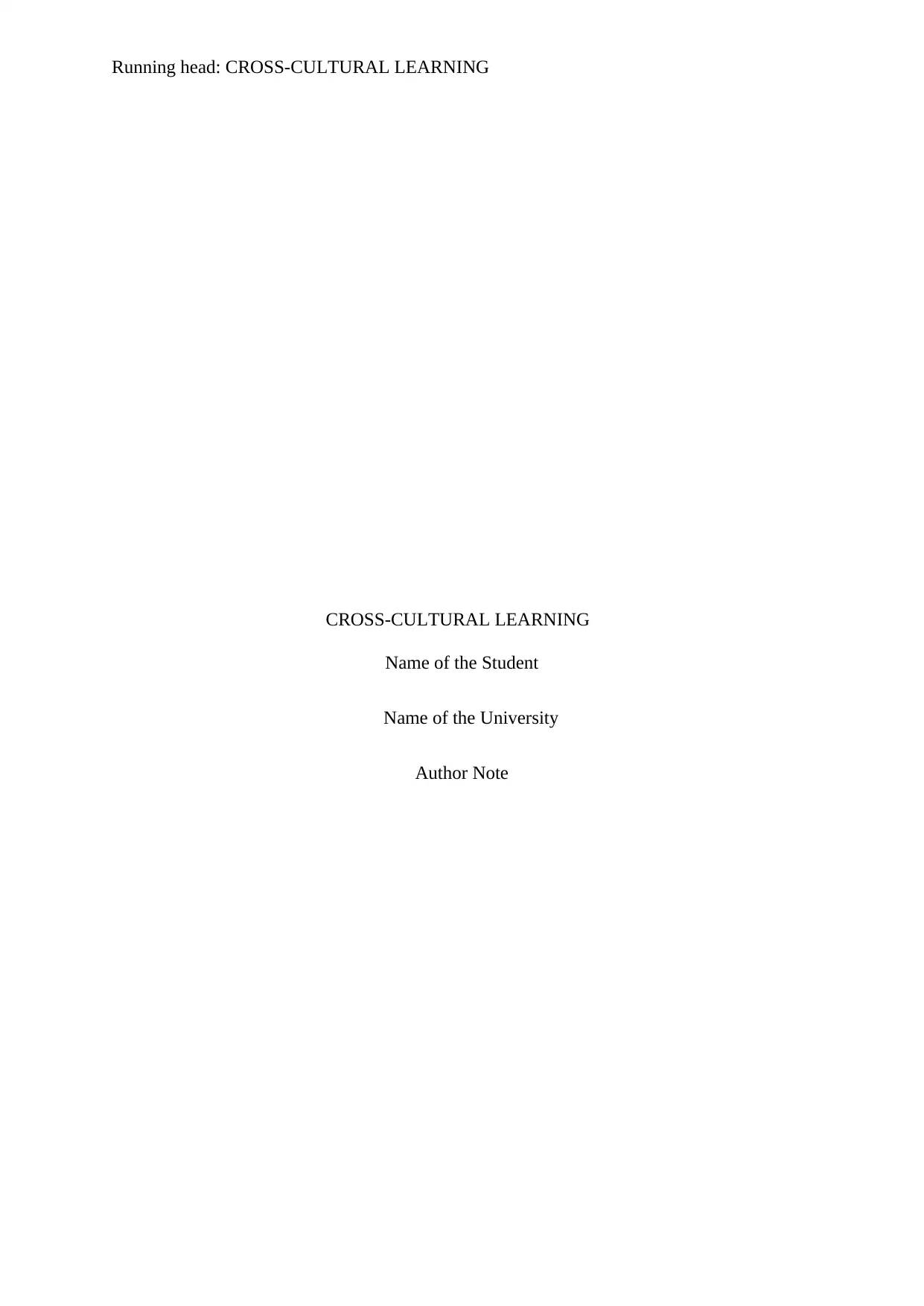
Running head: CROSS-CULTURAL LEARNING
CROSS-CULTURAL LEARNING
Name of the Student
Name of the University
Author Note
CROSS-CULTURAL LEARNING
Name of the Student
Name of the University
Author Note
Paraphrase This Document
Need a fresh take? Get an instant paraphrase of this document with our AI Paraphraser
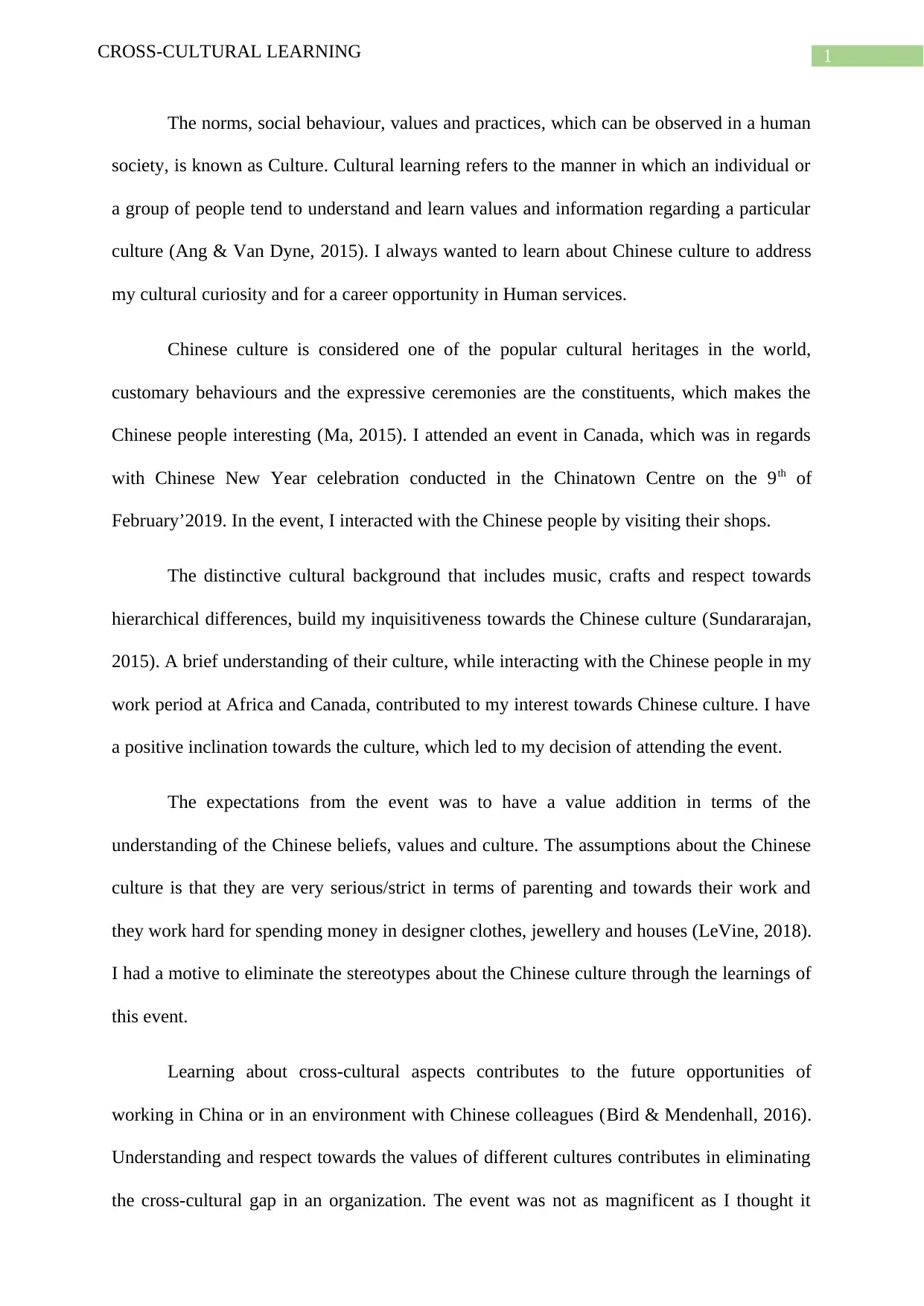
1CROSS-CULTURAL LEARNING
The norms, social behaviour, values and practices, which can be observed in a human
society, is known as Culture. Cultural learning refers to the manner in which an individual or
a group of people tend to understand and learn values and information regarding a particular
culture (Ang & Van Dyne, 2015). I always wanted to learn about Chinese culture to address
my cultural curiosity and for a career opportunity in Human services.
Chinese culture is considered one of the popular cultural heritages in the world,
customary behaviours and the expressive ceremonies are the constituents, which makes the
Chinese people interesting (Ma, 2015). I attended an event in Canada, which was in regards
with Chinese New Year celebration conducted in the Chinatown Centre on the 9th of
February’2019. In the event, I interacted with the Chinese people by visiting their shops.
The distinctive cultural background that includes music, crafts and respect towards
hierarchical differences, build my inquisitiveness towards the Chinese culture (Sundararajan,
2015). A brief understanding of their culture, while interacting with the Chinese people in my
work period at Africa and Canada, contributed to my interest towards Chinese culture. I have
a positive inclination towards the culture, which led to my decision of attending the event.
The expectations from the event was to have a value addition in terms of the
understanding of the Chinese beliefs, values and culture. The assumptions about the Chinese
culture is that they are very serious/strict in terms of parenting and towards their work and
they work hard for spending money in designer clothes, jewellery and houses (LeVine, 2018).
I had a motive to eliminate the stereotypes about the Chinese culture through the learnings of
this event.
Learning about cross-cultural aspects contributes to the future opportunities of
working in China or in an environment with Chinese colleagues (Bird & Mendenhall, 2016).
Understanding and respect towards the values of different cultures contributes in eliminating
the cross-cultural gap in an organization. The event was not as magnificent as I thought it
The norms, social behaviour, values and practices, which can be observed in a human
society, is known as Culture. Cultural learning refers to the manner in which an individual or
a group of people tend to understand and learn values and information regarding a particular
culture (Ang & Van Dyne, 2015). I always wanted to learn about Chinese culture to address
my cultural curiosity and for a career opportunity in Human services.
Chinese culture is considered one of the popular cultural heritages in the world,
customary behaviours and the expressive ceremonies are the constituents, which makes the
Chinese people interesting (Ma, 2015). I attended an event in Canada, which was in regards
with Chinese New Year celebration conducted in the Chinatown Centre on the 9th of
February’2019. In the event, I interacted with the Chinese people by visiting their shops.
The distinctive cultural background that includes music, crafts and respect towards
hierarchical differences, build my inquisitiveness towards the Chinese culture (Sundararajan,
2015). A brief understanding of their culture, while interacting with the Chinese people in my
work period at Africa and Canada, contributed to my interest towards Chinese culture. I have
a positive inclination towards the culture, which led to my decision of attending the event.
The expectations from the event was to have a value addition in terms of the
understanding of the Chinese beliefs, values and culture. The assumptions about the Chinese
culture is that they are very serious/strict in terms of parenting and towards their work and
they work hard for spending money in designer clothes, jewellery and houses (LeVine, 2018).
I had a motive to eliminate the stereotypes about the Chinese culture through the learnings of
this event.
Learning about cross-cultural aspects contributes to the future opportunities of
working in China or in an environment with Chinese colleagues (Bird & Mendenhall, 2016).
Understanding and respect towards the values of different cultures contributes in eliminating
the cross-cultural gap in an organization. The event was not as magnificent as I thought it
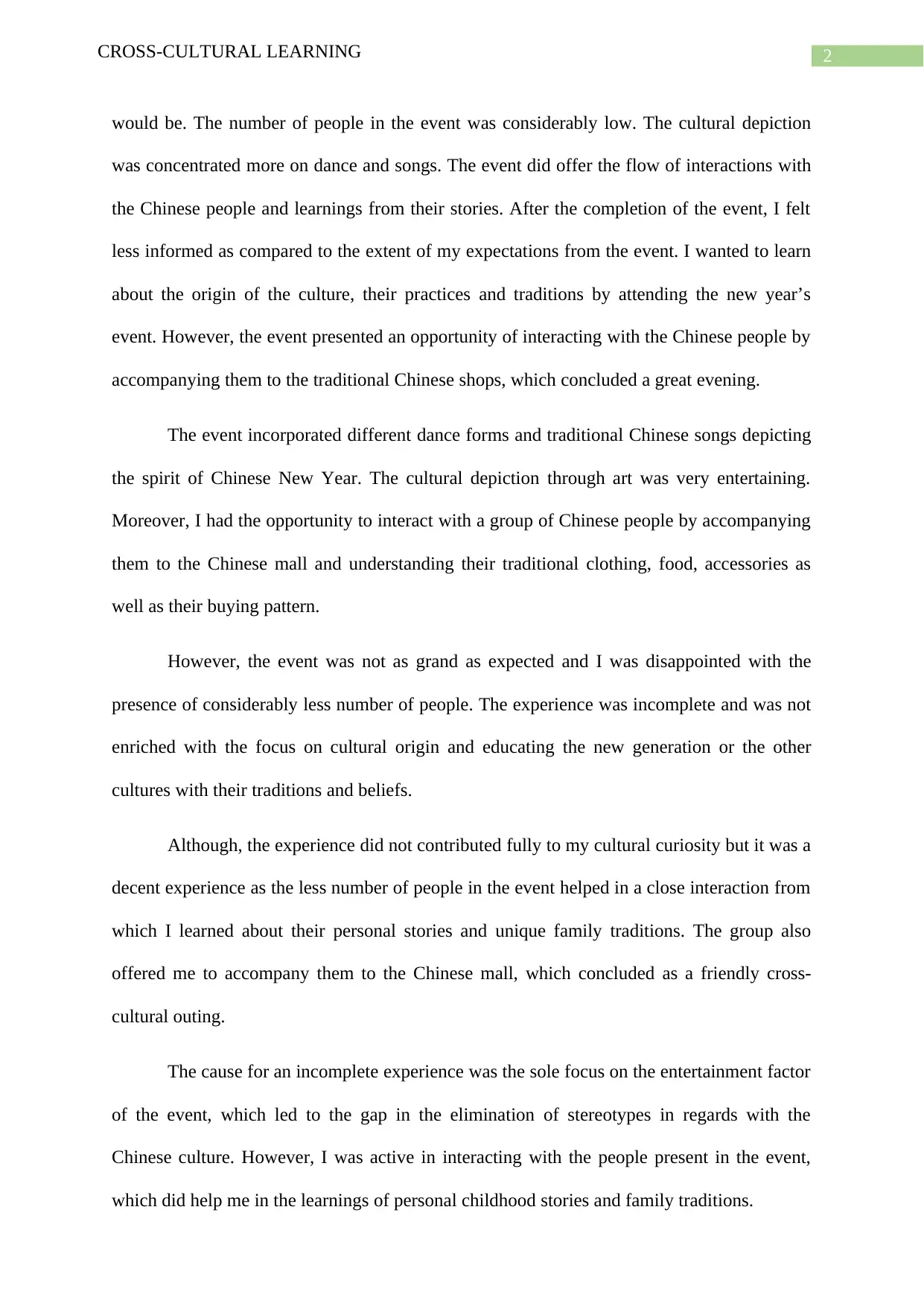
2CROSS-CULTURAL LEARNING
would be. The number of people in the event was considerably low. The cultural depiction
was concentrated more on dance and songs. The event did offer the flow of interactions with
the Chinese people and learnings from their stories. After the completion of the event, I felt
less informed as compared to the extent of my expectations from the event. I wanted to learn
about the origin of the culture, their practices and traditions by attending the new year’s
event. However, the event presented an opportunity of interacting with the Chinese people by
accompanying them to the traditional Chinese shops, which concluded a great evening.
The event incorporated different dance forms and traditional Chinese songs depicting
the spirit of Chinese New Year. The cultural depiction through art was very entertaining.
Moreover, I had the opportunity to interact with a group of Chinese people by accompanying
them to the Chinese mall and understanding their traditional clothing, food, accessories as
well as their buying pattern.
However, the event was not as grand as expected and I was disappointed with the
presence of considerably less number of people. The experience was incomplete and was not
enriched with the focus on cultural origin and educating the new generation or the other
cultures with their traditions and beliefs.
Although, the experience did not contributed fully to my cultural curiosity but it was a
decent experience as the less number of people in the event helped in a close interaction from
which I learned about their personal stories and unique family traditions. The group also
offered me to accompany them to the Chinese mall, which concluded as a friendly cross-
cultural outing.
The cause for an incomplete experience was the sole focus on the entertainment factor
of the event, which led to the gap in the elimination of stereotypes in regards with the
Chinese culture. However, I was active in interacting with the people present in the event,
which did help me in the learnings of personal childhood stories and family traditions.
would be. The number of people in the event was considerably low. The cultural depiction
was concentrated more on dance and songs. The event did offer the flow of interactions with
the Chinese people and learnings from their stories. After the completion of the event, I felt
less informed as compared to the extent of my expectations from the event. I wanted to learn
about the origin of the culture, their practices and traditions by attending the new year’s
event. However, the event presented an opportunity of interacting with the Chinese people by
accompanying them to the traditional Chinese shops, which concluded a great evening.
The event incorporated different dance forms and traditional Chinese songs depicting
the spirit of Chinese New Year. The cultural depiction through art was very entertaining.
Moreover, I had the opportunity to interact with a group of Chinese people by accompanying
them to the Chinese mall and understanding their traditional clothing, food, accessories as
well as their buying pattern.
However, the event was not as grand as expected and I was disappointed with the
presence of considerably less number of people. The experience was incomplete and was not
enriched with the focus on cultural origin and educating the new generation or the other
cultures with their traditions and beliefs.
Although, the experience did not contributed fully to my cultural curiosity but it was a
decent experience as the less number of people in the event helped in a close interaction from
which I learned about their personal stories and unique family traditions. The group also
offered me to accompany them to the Chinese mall, which concluded as a friendly cross-
cultural outing.
The cause for an incomplete experience was the sole focus on the entertainment factor
of the event, which led to the gap in the elimination of stereotypes in regards with the
Chinese culture. However, I was active in interacting with the people present in the event,
which did help me in the learnings of personal childhood stories and family traditions.
⊘ This is a preview!⊘
Do you want full access?
Subscribe today to unlock all pages.

Trusted by 1+ million students worldwide
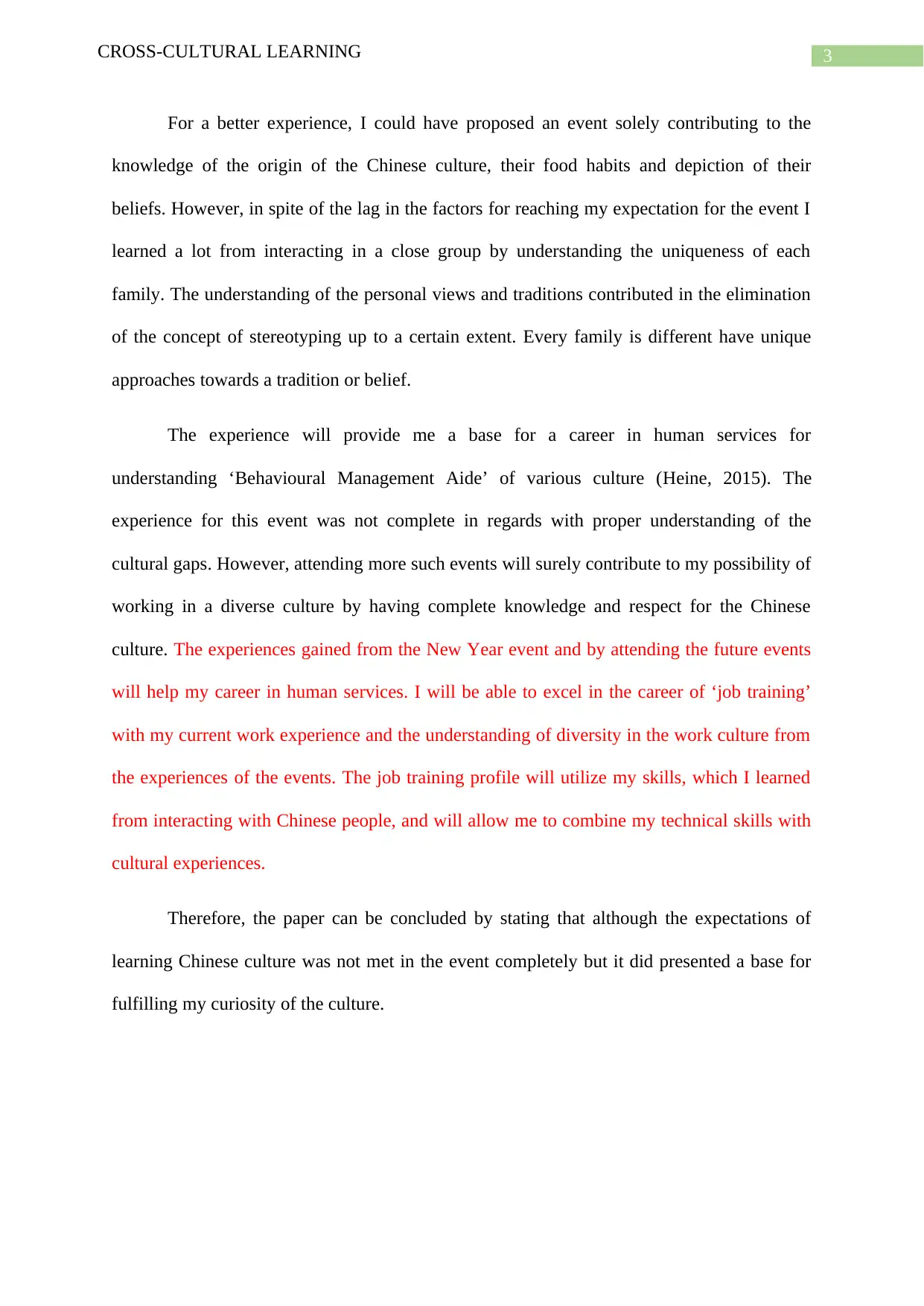
3CROSS-CULTURAL LEARNING
For a better experience, I could have proposed an event solely contributing to the
knowledge of the origin of the Chinese culture, their food habits and depiction of their
beliefs. However, in spite of the lag in the factors for reaching my expectation for the event I
learned a lot from interacting in a close group by understanding the uniqueness of each
family. The understanding of the personal views and traditions contributed in the elimination
of the concept of stereotyping up to a certain extent. Every family is different have unique
approaches towards a tradition or belief.
The experience will provide me a base for a career in human services for
understanding ‘Behavioural Management Aide’ of various culture (Heine, 2015). The
experience for this event was not complete in regards with proper understanding of the
cultural gaps. However, attending more such events will surely contribute to my possibility of
working in a diverse culture by having complete knowledge and respect for the Chinese
culture. The experiences gained from the New Year event and by attending the future events
will help my career in human services. I will be able to excel in the career of ‘job training’
with my current work experience and the understanding of diversity in the work culture from
the experiences of the events. The job training profile will utilize my skills, which I learned
from interacting with Chinese people, and will allow me to combine my technical skills with
cultural experiences.
Therefore, the paper can be concluded by stating that although the expectations of
learning Chinese culture was not met in the event completely but it did presented a base for
fulfilling my curiosity of the culture.
For a better experience, I could have proposed an event solely contributing to the
knowledge of the origin of the Chinese culture, their food habits and depiction of their
beliefs. However, in spite of the lag in the factors for reaching my expectation for the event I
learned a lot from interacting in a close group by understanding the uniqueness of each
family. The understanding of the personal views and traditions contributed in the elimination
of the concept of stereotyping up to a certain extent. Every family is different have unique
approaches towards a tradition or belief.
The experience will provide me a base for a career in human services for
understanding ‘Behavioural Management Aide’ of various culture (Heine, 2015). The
experience for this event was not complete in regards with proper understanding of the
cultural gaps. However, attending more such events will surely contribute to my possibility of
working in a diverse culture by having complete knowledge and respect for the Chinese
culture. The experiences gained from the New Year event and by attending the future events
will help my career in human services. I will be able to excel in the career of ‘job training’
with my current work experience and the understanding of diversity in the work culture from
the experiences of the events. The job training profile will utilize my skills, which I learned
from interacting with Chinese people, and will allow me to combine my technical skills with
cultural experiences.
Therefore, the paper can be concluded by stating that although the expectations of
learning Chinese culture was not met in the event completely but it did presented a base for
fulfilling my curiosity of the culture.
Paraphrase This Document
Need a fresh take? Get an instant paraphrase of this document with our AI Paraphraser
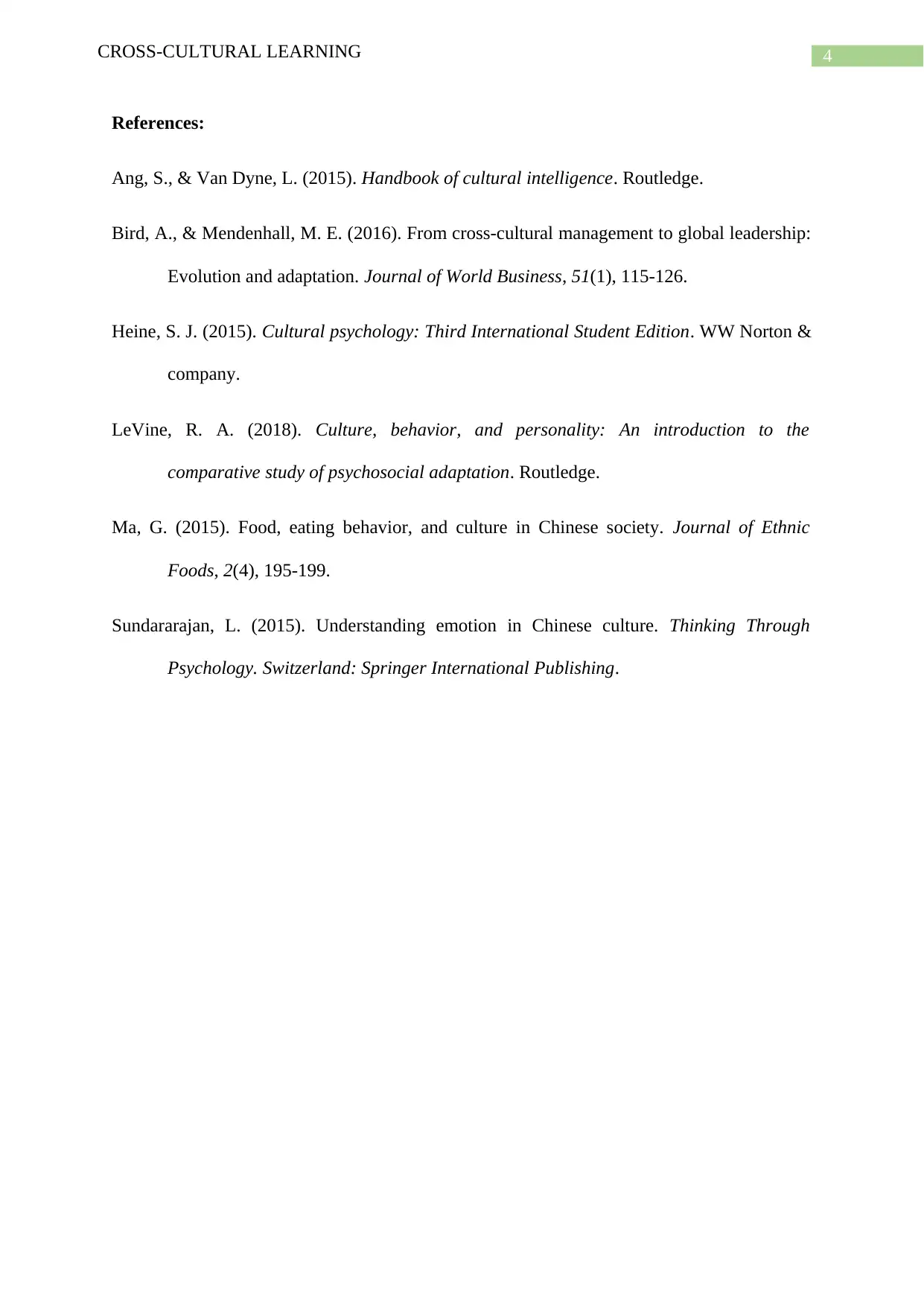
4CROSS-CULTURAL LEARNING
References:
Ang, S., & Van Dyne, L. (2015). Handbook of cultural intelligence. Routledge.
Bird, A., & Mendenhall, M. E. (2016). From cross-cultural management to global leadership:
Evolution and adaptation. Journal of World Business, 51(1), 115-126.
Heine, S. J. (2015). Cultural psychology: Third International Student Edition. WW Norton &
company.
LeVine, R. A. (2018). Culture, behavior, and personality: An introduction to the
comparative study of psychosocial adaptation. Routledge.
Ma, G. (2015). Food, eating behavior, and culture in Chinese society. Journal of Ethnic
Foods, 2(4), 195-199.
Sundararajan, L. (2015). Understanding emotion in Chinese culture. Thinking Through
Psychology. Switzerland: Springer International Publishing.
References:
Ang, S., & Van Dyne, L. (2015). Handbook of cultural intelligence. Routledge.
Bird, A., & Mendenhall, M. E. (2016). From cross-cultural management to global leadership:
Evolution and adaptation. Journal of World Business, 51(1), 115-126.
Heine, S. J. (2015). Cultural psychology: Third International Student Edition. WW Norton &
company.
LeVine, R. A. (2018). Culture, behavior, and personality: An introduction to the
comparative study of psychosocial adaptation. Routledge.
Ma, G. (2015). Food, eating behavior, and culture in Chinese society. Journal of Ethnic
Foods, 2(4), 195-199.
Sundararajan, L. (2015). Understanding emotion in Chinese culture. Thinking Through
Psychology. Switzerland: Springer International Publishing.
1 out of 5
Related Documents
Your All-in-One AI-Powered Toolkit for Academic Success.
+13062052269
info@desklib.com
Available 24*7 on WhatsApp / Email
![[object Object]](/_next/static/media/star-bottom.7253800d.svg)
Unlock your academic potential
Copyright © 2020–2026 A2Z Services. All Rights Reserved. Developed and managed by ZUCOL.




